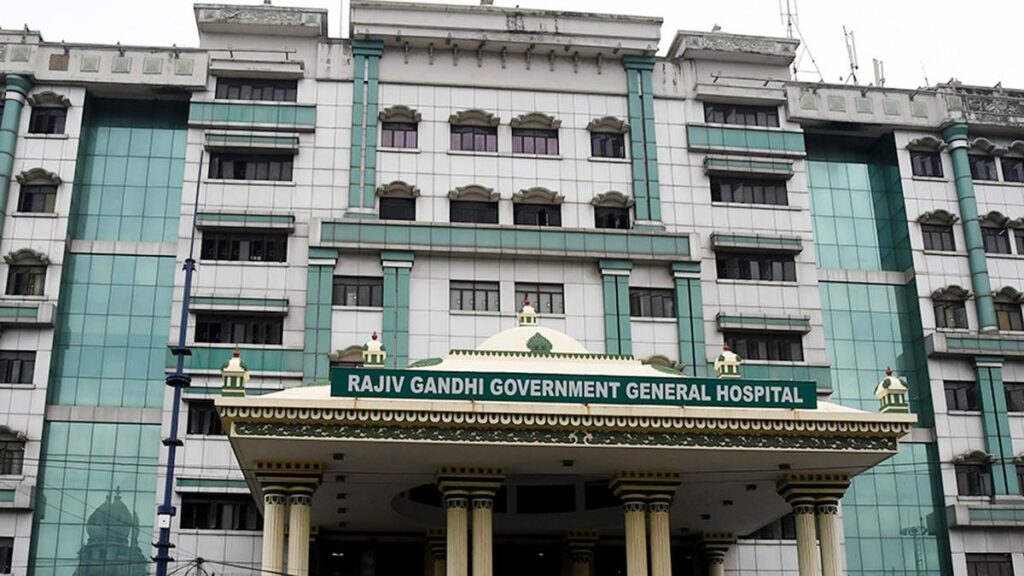
Rajiv Gandhi Government General Hospital in Chennai. File
| Photo Credit: B. Jothi Ramalingam
Tamil Nadu’s largest government hospital – Rajiv Gandhi Government General Hospital (RGGGH) – has designed and implemented a rapid response system – “Red Alert OBG” – to cut delays in treating critically ill pregnant women to prevent maternal mortality.
Observing high mortality rates among critically ill patients with multiorgan dysfunction referred from its affiliated institute – Institute of Obstetrics and Gynaecology (IOG) and Government Hospital for Women and Children, Egmore – RGGGH set up “Red Alert OBG”, a multidisciplinary team, in December 2024, and has gone on to demonstrate timely interventions that have reduced deaths over the past four months. Under this, a WhatsApp group with doctors from various specialities was formed to facilitate rapid case updates and provide specialist opinions to streamline communication, according to doctors.
E. Theranirajan, dean of RGGGH, said the aim of “Red Alert OBG” is to avoid delays and provide timely interventions for critically ill pregnant women. “IOG has a high dependency unit. If any sick pregnant woman is admitted and requires specialist opinion, doctors from RGGGH go there. Now, we have completely done away with this and patients are shifted to RGGGH. Through “Red Alert OBG”, we have ensured all specialists are available under a single roof to provide timely care,” he explained.
There are 61 members on the WhatsApp group including obstetrician-gynaecologist (OB-GYN), intensivists, cardiologists, nephrologists, neurologists, general surgeons, rheumatologists and blood bank medical officers. An assistant professor of OB-GYN and a post graduate from IOG are posted at RGGGH’s Intensive Medical Care Unit (IMCU) to monitor such patients round-the-clock.
Data from RGGGH shows that in the four months prior to the group’s formation, eight out of 42 referred patients died. In the subsequent four months, following the group’s establishment, the mortality rate among referred patients decreased by 50%, with four deaths out of 38 referrals. Before the “Red Alert OBG” group, four deaths occurred at IOG; after its formation, no deaths occurred at IOG, with all severe cases being transferred to RGGGH.
Preventing deaths at IOG suggests a significant improvement in referral processes and patient care, doctors said.
| Period | Total number of deliveries | Referral to RGGGH | Deaths at RGGGH | Recovered at RGGGH | Death at IOG before Red Alert OBG group |
| August to November 2024 | 7,543 | 42 | 8 | 34 | 4 |
| December 2024 to March 2025 | 6,163 | 38 | 4 | 34 | 0 |
A. Marimuthu, IMCU’s chief, said the initiative has enabled early intervention for pregnant women with medical conditions. “Once a sick pregnant woman is admitted, patient details are immediately posted on the group, alerting us. Many of them are referred to IOG from places such as Tiruvannamalai and Tiruvallur, raising the need to avoid any further delay in treatments,” he said.
At the IMCU, intensivists Murugan K.R and S. Shiva Malar Vizhi – assistant professors in Internal Medicine – closely monitor pregnant women who are shifted from the emergency ward after being referred from IOG. “Pregnant women can have acute infections or underlying medical conditions such as heart problems, autoimmune conditions and blood disorders which may or may not be already diagnosed. This is when they need an appropriate and intensive medical approach. When we are alerted, we ensure that we are ready with a bed, and the required equipment. All specialists are available under a single roof. Through this initiative, we can help sick pregnant women complete their pregnancy safely, ensuring maternal and foetal safety,” Dr. Murugan said.
Based on this model, the National Health Mission, Tamil Nadu has recently asked all Comprehensive Emergency Obstetric and Newborn Care centres to start similar WhatsApp groups comprising heads of all departments.
Published – April 06, 2025 12:50 am IST

